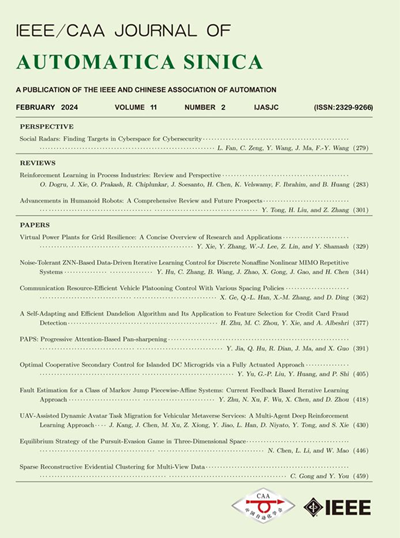社会困境下随机惩罚下的合作
IF 19.2
1区 计算机科学
Q1 AUTOMATION & CONTROL SYSTEMS
引用次数: 0
摘要
亲爱的编辑,这封信是关于在社会困境情况下合作策略的进化动力学。随机惩罚是指个体是否作为惩罚者是随机的,取决于个体对惩罚的偏好。同时,惩罚成本和叛逃者是否会受到惩罚也是随机的。在以前的模型中,惩罚的成本被认为是恒定的,或者与受惩罚的个人数量成正比。此外,所有叛逃者都应受到惩罚的假设经常被采纳。事实上,一些叛逃者可能会因为噪音的存在或惩罚成本的限制而不受惩罚,而且惩罚成本也取决于惩罚者的数量。在此基础上,建立了无限大混合种群随机惩罚的解析模型,研究了随机惩罚对合作进化的影响,并分析了在随机惩罚存在的情况下,如何有效地支持合作进化。这封信的目的是设计一种促进合作的随机惩罚,使系统进化到完全合作。利用复制因子方程探讨了随机惩罚下合作的进化动力学,并明确了自然选择对合作有利的条件。本文章由计算机程序翻译,如有差异,请以英文原文为准。
Cooperation Under Stochastic Punishment in Social Dilemma Situations
Dear Editor, This letter is concerned with the evolutionary dynamics of cooperative strategies in social dilemma situations. Stochastic punishment has been proposed, in which whether an individual acts as a punisher or not is stochastic and depends on its preference for punishment. Meanwhile, both the cost of punishment and whether a defector would be punished are also stochastic. In previous models, the cost of punishment is considered to be either constant or proportional to the number of individuals to be punished. Furthermore, the hypothesis that all defectors should be penalized is frequently adopted. Actually, some defectors may refrain from being punished due to the presence of noise or the limitation of the punishment cost, and the cost of punishment is also dependent on the number of punishers. Thus, we establish an analytic model of stochastic punishment for infinite and well-mixed populations, investigate the effects of stochastic punishment on the evolution of cooperation, and analyze how to support the evolution of cooperation effectively when the stochastic punishment is possible. The objective of this letter is to design a cooperation-promoting stochastic punishment that will allow the system to evolve to full cooperation. The replicator equations have been used to explore the evolutionary dynamics of cooperation under stochastic punishment, and the conditions under which cooperation is favored by natural selection have been specified.
求助全文
通过发布文献求助,成功后即可免费获取论文全文。
去求助
来源期刊

Ieee-Caa Journal of Automatica Sinica
Engineering-Control and Systems Engineering
CiteScore
23.50
自引率
11.00%
发文量
880
期刊介绍:
The IEEE/CAA Journal of Automatica Sinica is a reputable journal that publishes high-quality papers in English on original theoretical/experimental research and development in the field of automation. The journal covers a wide range of topics including automatic control, artificial intelligence and intelligent control, systems theory and engineering, pattern recognition and intelligent systems, automation engineering and applications, information processing and information systems, network-based automation, robotics, sensing and measurement, and navigation, guidance, and control.
Additionally, the journal is abstracted/indexed in several prominent databases including SCIE (Science Citation Index Expanded), EI (Engineering Index), Inspec, Scopus, SCImago, DBLP, CNKI (China National Knowledge Infrastructure), CSCD (Chinese Science Citation Database), and IEEE Xplore.
 求助内容:
求助内容: 应助结果提醒方式:
应助结果提醒方式:


